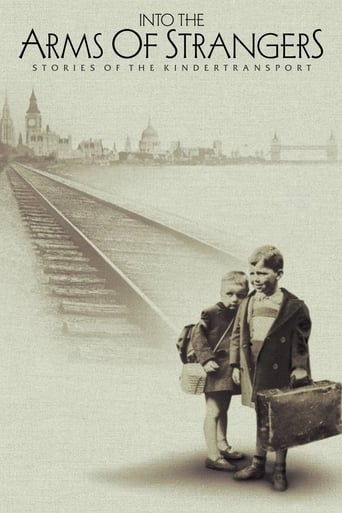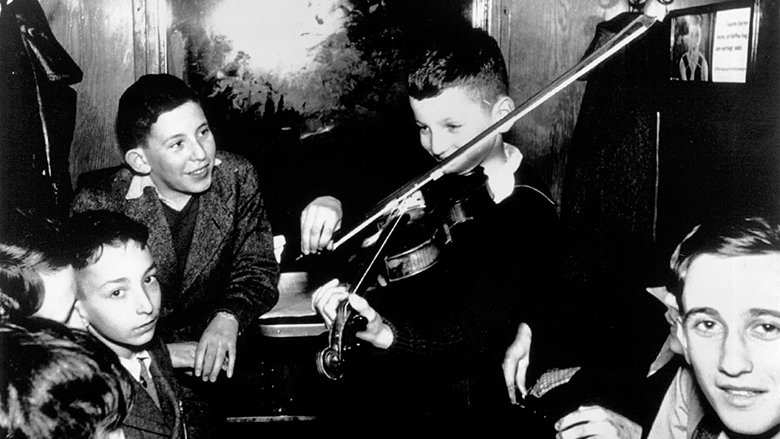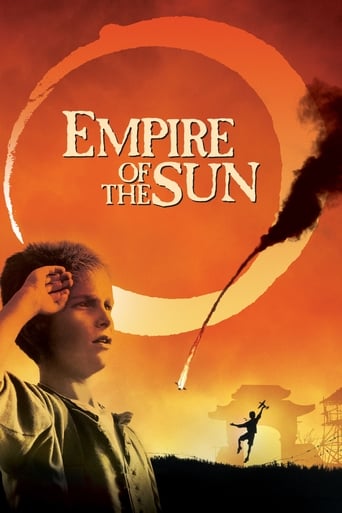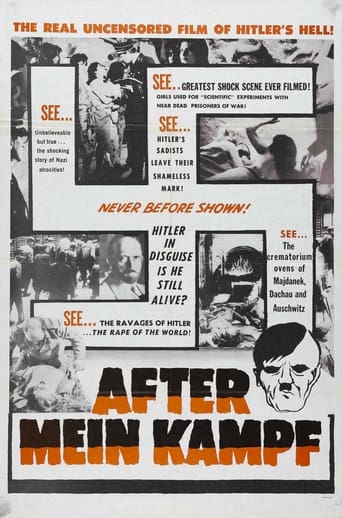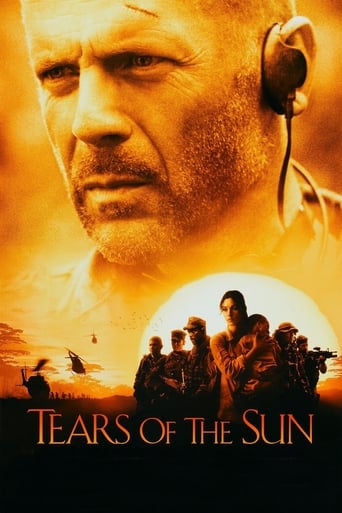Into the Arms of Strangers: Stories of the Kindertransport (2000)
In the nine months prior to World War II, 10.000 innocent children left behind their families, their homes, their childhood, and took the journey... to Britain to escape the Nazi Holocaust.
Watch Trailer
Free Trial Channels
Cast


Similar titles
Reviews
Self-important, over-dramatic, uninspired.
Highly Overrated But Still Good
The movie's not perfect, but it sticks the landing of its message. It was engaging - thrilling at times - and I personally thought it was a great time.
This movie feels like it was made purely to piss off people who want good shows
About an hour into my viewing of this documentary about Jewish children transported out of Germany for their own safety on the brink of WW II, my 10-year-old came up and, seeing how engrossed I was, slipped me a note that said:"Can you change to Disney at 9:30?This movie is scaring me. Check One: ____yes ____no"I hadn't occurred to me that from a child's point of view, the movie would be, by turns, frightening, disturbing, and dark. Certainly, up to that point, it was going in that direction. But what I was able to convey later to her (a former orphan herself) is that underneath the darkness there is light, if you look for it. This film was richly layered, as others on this site have already noted, with grief, despair, horror, regret and anguish, true. But countering it is the knowledge that there are good people in the world that will reach out in generosity to the victimized--just as British couples agreed, over a two year period and longer in the late 1930s, to provide homes to 10,000 endangered Jewish children. Another important positive is evident in every testimony in the film--from former transportees, a foster parent, host families, transport organizers. And that is the fierce, all-encompassing devotion between the Jewish family members affected by a perfect storm of historical events: the rise of a convincing megalomaniac who turned an entire country to antisemitism; increasing hostility in the immediate environment; the inability to earn a living or go to school; the wrenching separation of sending beloved children away; and finally the ultimate crisis of the adults "being transported" to the death camps. Through it all the devotion remains, unshaken. A father who adores his young daughter, hobbling with a cane after the train that is taking her away, takes her hands through the window and manages to pull her out--his overriding love trumping the knowledge that she would be safer away from her family. A 10-year-old on her own initiative goes door to door in London begging wealthy residents to hire her parents so that they can get work visas in order to escape Germany. An older transportee relates with quiet dignity and awe how her father died in a camp: beaten to death for protesting the guard's treatment of older inmates. Photos and restrained musical accompaniment throughout the movie lend both strength and pathos to each story.One doesn't have to be Jewish--and I am not--to appreciate how family ties and identity can remain intact through sheer will, despite horrific experiences as shown through this film. "Into the Arms" is universally compelling in its scope. It's also expertly crafted by director Harris so that interviewees become familiar and sympathetic protagonists and we raptly follow their stories, all different, in stages. Astutely, he makes sure we see that they are fully human--not angels or mere victims. One woman admits openly that she was taken from foster home to foster home because behaviorally, she was a handful (as one might expect of a child who finds herself living with complete strangers, speaking a foreign language). Another lied to her foster parents to arrange for her sister to be taken in, and cheerfully threw the lie back in their faces when the sister arrived, not at all what they expected. Finally, I was moved, as I always am, to see how the documentary format helps people deal with their demons by speaking about them. The man whose witness ends the film, whose experiences have been as anguished as anyone's, seems to say it all in discussing why he was saved and others were not, impassioned but optimistic. If you haven't seen "Into the Arms" but are looking for a new prism from which to view the Nazi era and what people in all circumstances can extract from suffering, I highly recommend this film.
This effort will not be for everyone. But if you have a desire in life to see right prevail, to see what is good, and if you live a life of love, then you will cherish this movie. I got this movie from the local library on a lark, and immediately following the end, I went on line and ordered it. It is very well done. The producers and directors here did a perfect job. If you are looking for sex and violence, this is not for you. But if you want to learn and be truly enriched in your life, then this offering is just the ticket. I am not Jewish but after watching this I feel as if I had been born Jewish. This movie has filled a space in my heart I was not aware of. I Cr 13;8a
Along 1938 and 1939, the United Kingdom welcomed 10,000 Jewish children from Germany, Austria and Czechoslovakia through the Kindertransport program. Most of the other countries, including the United States of America, refused to accept these children. With the beginning of the World War II, this relocation was interrupted. "Into the Arms of Strangers" is a documentary, based on the remembrances and touching testimony of some survivors discussing their reality in their new homes or foster houses, their adaptation problem far from their parents, families and birth country and language and illustrated by photos and footage from that sad period. In the end, the viewer is not sure whether these children were lucky, or whether it might be better for them stay with their families and face the Holocaust together, due to their serious childhood trauma. Inclusive some of them did not speak the original language anymore, and needed an adaptation period to meet their parents again in the end of the war. As mentioned by another user, "this film is at once a testament to man's inhumanity". Unfortunately, the saddest thing to say is that more than fifty years later, we see Bosnian, Africans, Palestines, Iraquians etc. children being separated from their families due to the intolerance of the mankind. I can never forget the image of that Iraquian orphan without both arms on TV. My vote is seven.Title (Brazil): "Nos Braços de Estranhos" ("Into the Arms of Strangers")
I caught this movie on a local PBS station one night as I was flipping through channels while waiting for some friends. I had to watch the rest after seeing only a little. This is a good documentary--nothing too flashy or innovative in the making--but stunning because of the material.Maybe it struck a chord with me because of resonances and trauma in my own childhood--but I think it's more than that. Look at children's books (and books about children) and a lot addresses themes of orphanage, abandonment, loss of parents and related issues (from Roald Dahl or Charles Dickens, for example). This documentary strikes these themes head on with real stories. It's hard not to be moved by the vulnerability of children in such dire circumstances.The stories are both heart breaking and heart warming and will make you wonder how such cruelty and evil could exist to create these events in the life of a child. On the other hand, many ordinary people rose to the occasion and did something heroic to help these vulnerable, often orphaned children of World War II.This is a wonderful and painful film to watch because of the stories of the now grown children. I'll mention a few examples (**spoilers**), so if it's going to bother you to have a bit of a preview, don't read on.One boy, after being placed with a family in England for 6 or 7 years during WWII, finally got the miracle of meeting his parents again after they had somehow come through the war. He no longer spoke the same language (English, not German), felt uncomfortable and awkward even meeting them again because they no longer seemed like the same people. It was a wonderful and painful reunion.Most kindertransport children were not so lucky, waited years for their parents to find them after the war, and then discovered that the reunion would never take place. Still waiting with an empty spot in their hearts.Some evacuee children tried bringing their parents to England before emigration from Germany was shut down by the Nazis. One girl tells of looking for the large, wealthy homes, going door to door, and begging the occupants to give her parents a job so that they would be granted visas by the British government.Some of these children (who initially spoke little English) were treated well, adopted and loved in new families. Many were taken care of but were moved from one foster home to another, and some had horrible experiences such as being sent to families who wanted to use them as servants (uniforms and all) rather than treating them with respect or care.I've seen a lot of different films and documentaries about Nazi Germany over the years, but I'm not particularly moved by many of them since they don't always personalize the experience. Many of these types of films just leave me numb afterward and though I appreciate and understand the horror, these films often leave me relatively unmoved and mostly just horrified.I'd recommend watching this documentary even if you don't like the typical Nazi Germany documentary. This isn't only about a historical event, but about vulnerability, evil, heroism, desperation, grief and a kind of redemption. The themes are reflected in the personal stories of children brought to a foreign land without their parents. I doubt most people could come away from this movie feeling unmoved or unchanged by the experience in some way. In other words, see this documentary. You won't regret it.

